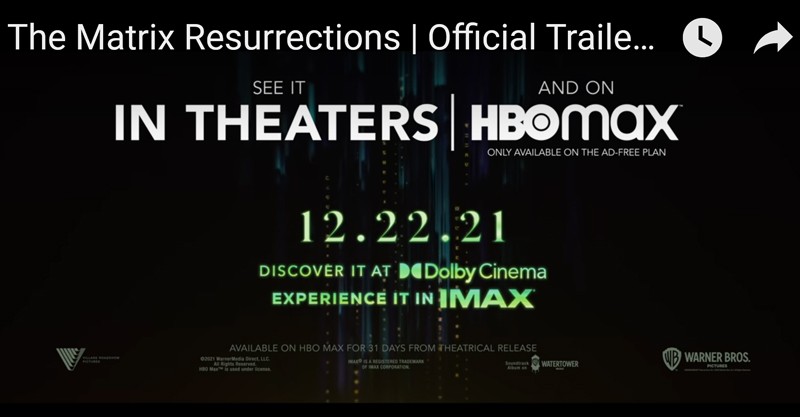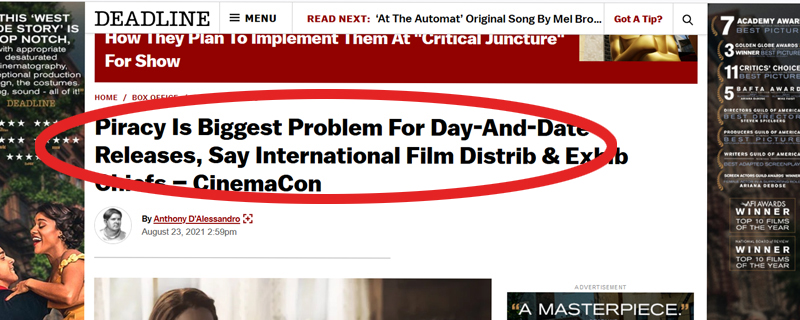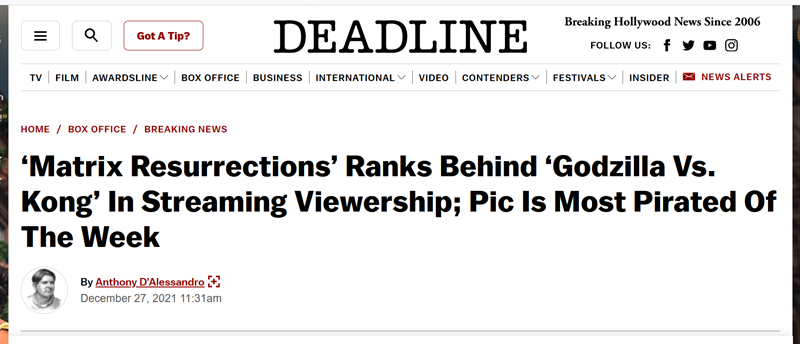
A financier that invested billions of dollars in producing films with Warner Bros. Pictures asserts in a lawsuit that simultaneous streaming with cinema premieres diminishes economic return, especially from piracy spawned by streaming.
Australian media company Village Roadshow (VRS) sued Warners for premiering its calendar 2021 film slate (17 theatricals) on corporate sibling video-on-demand HBO Max at the same time as cinemas. VRS invested $4.5 billion in 91 Warner Bros. Pictures movies over 25 years. The lawsuit was filed last month. Warner Bros. vigorously denied allegations (more later on the studio’s response).
Reviewing the 50-page VRS complaint, it’s clear VRS outlined what it calls economic pain from Warners’ decision to make theatrical release of some co-financed Warner theatricals “day and date” — meaning premiere on multiple platforms simultaneously. That alone is a revelation since some pundits claim theatrical is dead; but clearly an exclusive cinema release generates revenue and also the whets audience appetite for later windows including streaming.

“Given the unproven nature of the day-and-date [simultaneously cinema and HBO Max] release strategy, WB effectively used ‘The Matrix Resurrections’ as a test case while maintaining a tried-and-true release strategy for its own wholly owned films, ‘Black Adam’ and ‘The Batman,’ VRS says in the lawsuit.
“The hit to ‘The Matrix Resurrections’ box office returns was not the result of just the cannibalization from streaming but from the rampant piracy it knew would come by distributing this marquee picture on a streaming platform on the same day as its theatrical release,” the VRS complaint says. “The cumulative result was devastating.” Industry researchers estimate “Resurrections” was the most pirated movie after its streaming/cinema release, with the VRS complaint blaming unauthorized duplication from streaming runs.
A key point of contention is the marketplace performance of the R-rated “Matrix Resurrections,” which is a fourth movie in Warners’ science-fiction action film franchise. The movie co-financed and co-owned by VRS. “Resurrections” premiered domestically Dec. 22, generating a poor $38 million in boxoffice in the U.S./Canada (another $119 million worldwide in overseas boxoffice) while simultaneous telecast on HBO Max. The flick generally got mediocre reviews from critics, whose impact on audience is difficult to measure.
The VRS complaint notes that Sony Pictures’ mega-blockbuster “Spider-Man: No Way Home” premiered the same month as “Matrix Resurrections” but “Spider-Man” posted huge boxoffice as a cinema exclusive with no parallel video streaming.
“Since the dawn of the big screen, the financial success of a feature film has been measured by theatrical revenue, with opening weekend box office receipts being a nearly infallible measure of ultimate financial returns as it directly and positively correlated with ancillary revenue streams,” the VRS complaint says. Some pay TV contracts specify the license fee based on a formula in which boxoffice is the main input.
Further, the VRS complaint says Warners mounted what it called “‘Project Popcorn,’ the internal code name for its clandestine plan to materially reduce box office and correlated ancillary revenue generated from tent pole films that Village Roadshow and others would be entitled to receive in exchange for driving subscription revenue for the new HBO Max service, for which only WarnerMedia would be the sole beneficiary.” The VRS complaint alleges Warners “refused to account to Village Roadshow for any of that value.” Tent pole films are the biggest movies on a distributor’s film slate.
Cinema talent was upset with day-and-date premieres. But for “Resurrections” the major studio “reached acceptable accommodations, without resorting to litigation, with talent like Keanu Reeves, Carrie-Anne Moss and Lana Wachowski,” states the VRS complaint.
The VRS complaint claims Warners violations for not sharing each co-owned film’s marketing plan, promising never to license films to Warner affiliates in sweetheart deals.
“Under the parties’ contracts, WB is also required to provide a Marketing Plan for each film and to distribute each film in a manner ‘consistent with industry standards’ and ‘consistent with customary commercial practices in the motion picture industry’,” the VRS complaint says.
At the time, a 90-day window separating cinema from the next window were customary for major films, though the pandemic upended conventions. Mostly smaller-budget indie films were the only day-and-date releases. Film distributors put big films on the shelf in 2020 and 2021 waiting for a post-pandemic, normalized environment.
Also, “WB expressly agreed not to make sweetheart deals with its affiliates: it could not enter agreements with related entities unless it could show that the economic terms of those agreements ‘are not less favorable’ than a ‘comparable, arm’s length agreement’ involving unaffiliated entities,” the VRS complaint says.
Regarding the HBO Max run of “The Joker,” the VRS complaint says “WB stated that it receives only the generic ‘pay television’ fees, and charges its sister company nothing more for streaming on the new HBO Max streaming service.” VRS is a partner in “The Joker.”

VRS says Warners got the “additional benefit of boosting its parent company’s stock” with HBO Max streaming at the expense of financial return for VRS. Warners owes “an honest accounting of all earnings, including the enterprise value earned using Village Roadshow’s intellectual property to steer subscribers to HBO Max,” states VRS. “WB provided Village Roadshow with no notice and WB made no mention of this strategy, as the parties’ contracts require.”
Though not referenced in the complaint, Forbes columnist Scott Mendelson interpreted one “Resurrections” movie poster as subtly suggesting audiences see the movie on HBO Max. This poster shows a blue and red pill, which are a reference from the movie in which blue pills are for illusion. The stark poster’s main text says simply “The Choice Is Yours,” creating a touch of mystery. “The choice is clear: multiplexes are ‘the real world,’ while streaming is ‘a comforting false illusion,’” Mendelson postulates.
In 2021, theater closures due to the pandemic also hurt boxoffice. Disney did a switcheroo last year creating the same day-and-date distribution for some of its theatricals on its Disney+ streaming service. Because of day-and-day for “Wonder Woman 1984,” Disney was sued by Scarlett Johansson in July but quickly reached a settlement with the actress.
Among issues are that VRS claims it is being squeezed out of spinoffs of movie properties that it co-owns, including a new Willie Wonka kids film and TV series adaptation of “Edge of Tomorrow.”
Warners made a more detailed response than normal in Hollywood corporate squabbles to the VRS lawsuit. Warner asserts that VRS reneged on its contractual obligation to pay its share of “Matrix Resurrections” and the studio reached accords with talent in movies impacted but VRS chose to be a holdout. Lawsuits are “not how we conduct business, certainly not with trusted partners,” says a Warner Bros. spokesperson.
According to a Variety article, “Warner Bros. argues in new court filings that it never agreed to an exclusively theatrical release for ‘The Matrix Resurrections,’ and that Village Roadshow still owes $112.5 million in production expenses on the project.”
The Variety article by Gene Maddaus adds that the Warners position is that it “agreed to a ‘wide release’ for ‘The Matrix Resurrections,’ which is defined in the contract as at least 1,000 screens. [A studio attorney] argued that Warner Bros. more than lived up to the bargain, releasing the film on 5,000 screens.”
VRS is an Australia-based entertainment conglomerate. The 91 jointly-financed and co-owned films of partnership were distributed by Warner Bros. Pictures, which is an attraction since distribution is the most profitable part of the movie business.
VRS has co-financed and co-owns with Warners “Joker,” ‘Sully,” “Mad Max: Fury Road,” “American Sniper,” the “Sherlock Holmes” films, “Miss Congeniality,” “Training Day,” “Mystic River,” animated “Happy Feet,” “I Am Legend,” “The Great Gatsby” and “San Andreas.”
Warners is the largest of Hollywood’s five major movie studios, but cash-short since the Atari video game debacle in 1980s when the two businesses then were under the same corporate roof (Warners is not involved in today’s incarnation of Atari). Being capital-poor made Warners the Hollywood major studio most eager to tap third-party film co-financing for decades, which enabled Warners to keep its film release pipeline filled. But those co-financiers share in returns, which in the case of VRS spurred litigation.
Warner Bros. is part of WarnerMedia, which has a pending $43 billion sale to cable TV channel giant Discovery Inc.
Related content:
Leave a Reply